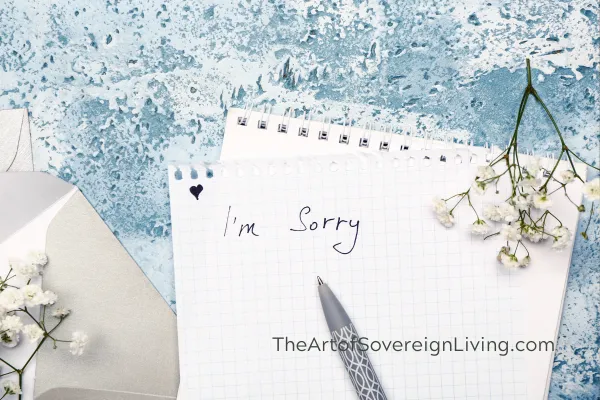BLOG
The Art of Sovereign Living
After Codependency

No More Apologizing for Simply Existing or Expressing Your Feelings
As women, many of us have been conditioned to apologize—often unnecessarily. Whether it's saying "sorry" for speaking up, taking up space, or asserting our needs, this habit can become a deeply ingrained behavior, especially for those who've endured narcissistic abuse or other toxic relationships. Over-apologizing isn't just a habit; it's a way we minimize ourselves to accommodate others, often at the expense of our own worth and well-being.
If you've found yourself apologizing for things you don't need to, like expressing your feelings or simply existing, know this: you don't have to live that way anymore. It's time to own your space unapologetically and reclaim your right to take up room in this world.
Why Over-Apologizing Happens
1. A Response to Emotional Abuse
In relationships with emotional manipulators, you may have been made to feel as though your needs, opinions, or even your presence were burdensome. Apologizing became a way to keep the peace, avoid conflict, or deflect criticism.
2. Conditioning to Prioritize Others
Many women are taught from a young age to prioritize others' needs over their own. This often translates into apologizing whenever we feel we've inconvenienced someone—even if we haven't.
3. Fear of Rejection
Apologizing excessively can stem from a deep-seated fear of rejection or abandonment. By saying "sorry" preemptively, you may have tried to avoid being dismissed or hurt.
While these behaviors may have helped you survive in the past, they no longer serve you. Shedding the habit of over-apologizing is an essential step toward owning your space and living authentically.
The Cost of Over-Apologizing
When you over-apologize, you send a subconscious message to yourself and others: I don't deserve to take up space. This undermines your confidence, weakens your boundaries, and diminishes the importance of your needs and feelings. Over time, it can erode your sense of self-worth and make it harder to establish balanced, respectful relationships.
How to Stop Apologizing for Existing
1. Pause and Reflect Before Saying "Sorry"
The next time you feel an apology on the tip of your tongue, pause and ask yourself:
Am I truly at fault, or am I apologizing out of habit?
Is this situation really my responsibility to fix?
Would I expect someone else to apologize for the same thing?
If the answer is no, skip the apology. Instead, try expressing yourself without diminishing your worth.
2. Replace Apologies with Gratitude or Assertiveness
Sometimes, we apologize when gratitude or assertiveness would be more appropriate. For example:
Instead of: "Sorry for being late," try: "Thank you for waiting for me."
Instead of: "Sorry, I just have a quick question," try: "I have a question I'd like to ask."
This subtle shift reinforces your right to exist and engage without minimizing yourself.
3. Assert Your Needs Without Guilt
You have a right to express your needs and feelings without apologizing for them. Practice using "I" statements to communicate assertively:
"I need more time to process this."
"I feel overwhelmed and need some space."
"I prefer to do it this way because it works better for me."
Assertive communication helps you own your space while fostering respect in your relationships.
4. Recognize Your Worth
Remind yourself that you are inherently valuable simply by being you. Your presence, voice, and contributions matter. Practice affirmations like:
"I am worthy of love, respect, and understanding."
"I have a right to take up space in this world."
"My needs and feelings are valid."
These affirmations can help rewire your mindset and build your confidence over time.
Reclaiming Your Space in Relationships
Owning your space doesn't mean being selfish or disregarding others—it means recognizing that your worth is equal to theirs. Healthy relationships are built on mutual respect, where both people feel seen, heard, and valued. By shedding the habit of over-apologizing, you create room for authentic connection and set the tone for relationships that honor your sovereignty.
Empowerment in Action
Here's a simple challenge to start reclaiming your space today:
For one week, track how often you say "sorry" in situations where it's not truly necessary. Write down each instance and reflect on why you felt compelled to apologize. Then, practice replacing those apologies with gratitude or assertiveness.
With time, you'll notice a shift—not just in how others respond to you but also in how you feel about yourself.
You Deserve to Take Up Space
You are not too much. You are not a burden. You are a woman of worth, and your existence is enough. By owning your space, you model self-respect and inspire others to do the same.
The journey to shedding the habit of over-apologizing may feel uncomfortable at first, but it is profoundly liberating. Step by step, you'll discover the power of living unapologetically as your authentic, empowered self.
With love and healing,
Jillian
FREE DOWNLOAD
Free E-book:
The Sovereign Woman’s Roadmap: Reclaiming
Your Power & Trusting Yourself Again
Ready to break free from codependency and reclaim your sovereignty?
The Sovereign Woman’s Roadmap is your step-by-step guide to healing from self-abandonment, rebuilding self-trust, and stepping into a life of empowerment and purpose.
This free e-book provides practical tools, trauma-informed strategies, and self-reclamation exercises to help you break old patterns, set strong boundaries, and rise into the empowered, sovereign woman you were meant to be.
Download your free copy today and take your first step toward freedom, self-worth, and emotional sovereignty!
© Copyright 2025 JD Integrative Coaching, LLC - Privacy Policy - Terms & Conditions - Disclaimer

